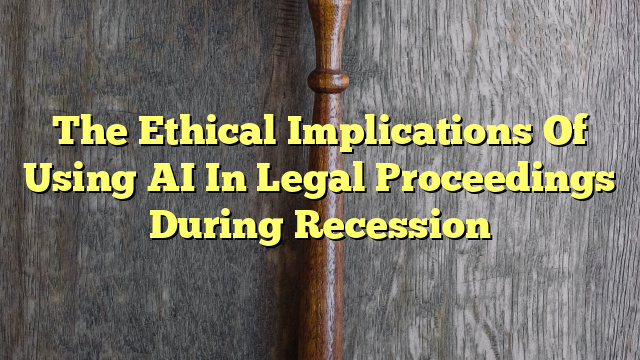Table of Contents
Ethical Concerns of AI in Law
Artificial Intelligence (AI) has become increasingly prevalent in various industries, including law. However, its adoption in legal proceedings during a recession raises several ethical concerns.
One major concern is the potential bias in AI algorithms. If the algorithms are trained on biased data or programmed with biased instructions, they can perpetuate existing inequalities and discrimination. This can lead to unfair outcomes, especially for marginalized communities.
Another concern is the lack of transparency in AI decision-making. AI systems often operate as black boxes, making it difficult to understand how they arrive at their conclusions. This lack of transparency can undermine trust in the legal system and raise questions about accountability.
Additionally, there is a concern about the displacement of human lawyers. As AI systems become more capable of performing legal tasks, there is a risk of job loss for human lawyers. This raises ethical questions about the impact on livelihoods and the potential loss of human judgment and empathy in legal proceedings.
Ethical Implications of Using an AI
When using an AI in legal proceedings during a recession, there are several ethical implications to consider.
One implication is the potential for errors or biases in AI decision-making. If the AI system is not properly trained or validated, it can lead to incorrect or unfair outcomes. This can have serious consequences for individuals involved in legal proceedings, particularly in times of economic hardship.
Another implication is the loss of human judgment and discretion. AI systems are designed to analyze data and make decisions based on patterns and algorithms. However, they may not take into account the unique circumstances or nuances of a case. This can lead to a lack of empathy and understanding in legal proceedings, which are essential for ensuring justice.
Furthermore, there is a concern about the erosion of privacy. AI systems often require access to large amounts of data to operate effectively. This raises questions about the collection, storage, and use of personal information, as well as the potential for surveillance and infringement on individual rights.
Ethical Concerns Related to AI Systems
There are several ethical concerns related to the implications of AI systems in legal proceedings during a recession.
One concern is the potential for algorithmic bias. AI systems can reflect and amplify existing biases in society, leading to discriminatory outcomes. This can disproportionately affect vulnerable populations and perpetuate systemic inequalities.
Another concern is the lack of accountability and transparency. AI systems often operate as black boxes, making it difficult to understand how they arrive at their decisions. This can make it challenging to identify and address any biases or errors in the system.
Additionally, there is a concern about the concentration of power. AI systems are often developed and controlled by a few large corporations or organizations. This concentration of power can lead to a lack of diversity and democratic oversight in the development and deployment of AI systems.
Ethical and Legal Considerations in AI
When using AI in legal proceedings during a recession, it is crucial to consider both ethical and legal considerations.
From an ethical standpoint, it is important to ensure fairness, transparency, and accountability in AI decision-making. This can be achieved through rigorous testing, validation, and ongoing monitoring of AI systems. Additionally, there should be mechanisms in place to address and rectify any biases or errors that may arise.
From a legal standpoint, there may be a need to update existing laws and regulations to account for the use of AI in legal proceedings. This includes addressing issues such as data privacy, algorithmic accountability, and the impact on human rights. It is essential to strike a balance between promoting innovation and protecting individuals’ rights and interests.
</

